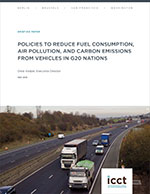Policies to reduce fuel consumption, air pollution, and carbon emissions from vehicles in G20 nations
 This briefing paper reviews the status of motor vehicle energy efficiency and emissions control programs in G20 nations. These programs have four components: low-sulfur fuel standards; tailpipe emissions standards for new vehicles; fuel economy and CO2 standards for new vehicles; and voluntary Green Freight programs. The briefing also summarizes information on technology availability and costs, emissions reductions, and benefit-cost ratios.
This briefing paper reviews the status of motor vehicle energy efficiency and emissions control programs in G20 nations. These programs have four components: low-sulfur fuel standards; tailpipe emissions standards for new vehicles; fuel economy and CO2 standards for new vehicles; and voluntary Green Freight programs. The briefing also summarizes information on technology availability and costs, emissions reductions, and benefit-cost ratios.
Related Content
- Impact assessment of vehicle electrification on regional air quality in China and climate impact assessment of electric vehicles 2050
- Energy and air pollution: World Energy Outlook Special Report 2016
- Wheel harrows
- Energy management needs top priority
- Is it time for Asia to abandon the dream of an effective multilateral climate treaty and adopt new approach?
- Fuel economy standards: sanctity of decision making process must be upheld
